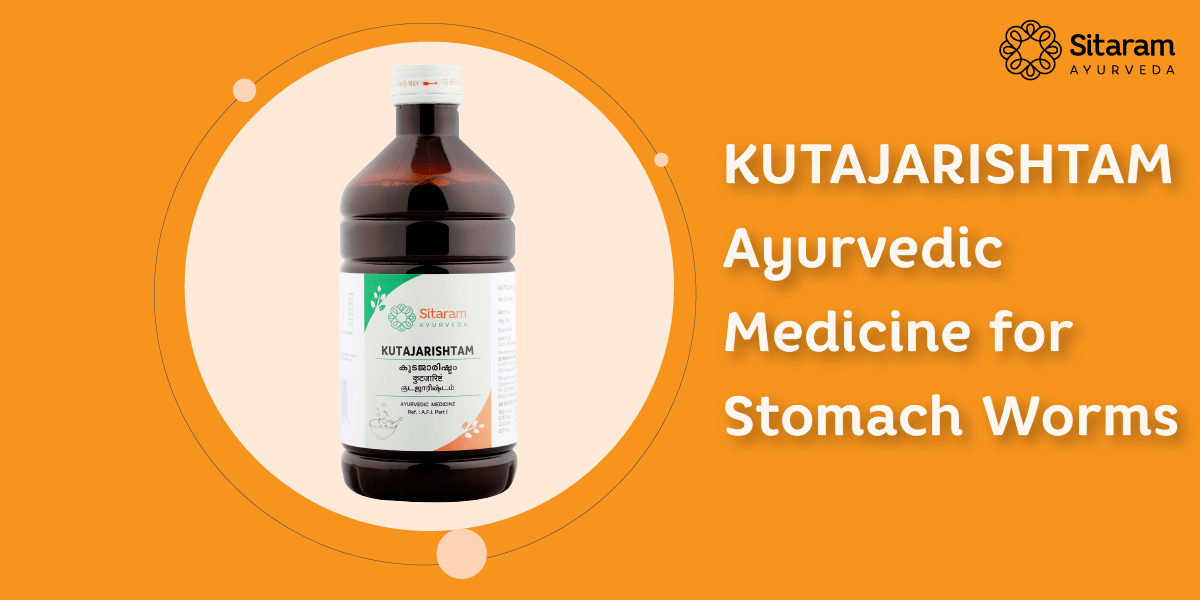KUTAJARISHTAM – Ayurvedic Medicine For Intestinal Worms

Kutajarishtam is a self-generated alcoholic preparation. The formulation is explained in the textbook ‘Bhaishajyarathnavali’.
Primary Ingredients
- Kutajam (Holarrhena antidysentrica)
- The plant shows anti-diarrhoeal, anti-diabetic, antihyperlipidemic, anti-urolithic, antimicrobial activities etc.
- Draksha (Vitis vinifera)
- The dry fruit shows antioxidant, cardioprotective, antimicrobial, antiviral and hepatoprotective activities.
- Madhuka (Glycyrrhiza glabra)
- This plant has many medicinal properties like antimicrobial, antioxidant and anti-inflammatory. In addition, the plant also shows antitussive, antiviral, antiulcer, hepatoprotective and antiallergic activities.
- Gambhari (Gmelina Arborea)
- The plant shows antioxidant, antihelminthic, antimicrobial, anti-diabetic, diuretic, cardioprotective, antipyretic and immunomodulatory activities.
- Jaggery
- Dhathaki (Woodfordia fruticosa)
Method of Preparation
Coarse powder of herbs added to water is boiled and a decoction is made. To this decoction, jaggery and Dhathaki is added. The mixture is kept in an airtight container for one month for fermentation.
Indications of Kutajarishtam
Kutajarishtam and Intestinal Worms
Kutajarishtam is effective in the management of worm infestations. Kutajarishtam is effective in children and adults. In addition, Kutajarishtam, along with Krimighna Vati, is useful in the treatment of intestinal worms.
Kutajarishtam and Diarrhea
Kutajarishtam is effective in the treatment of loose motions and dysentery.
Kutajarishtam and Digestive power
The formulation strengthens the digestive power. As a result, it improves absorption and appetite. In addition, the formulation is also effective in the treatment of malabsorption.
Kutajarishtam and IBS
Irritable bowel syndrome is a common disorder affecting the large intestine, and the symptoms include abdominal pain, bloating, diarrhea, constipation, or both. Kutajarishtam is effective in the management of IBS.
Kutajarishtam and Fever
It is effective in the treatment of chronic fever.
Dose
- One should take medicine only under medical supervision.
- Commonly 15-30 ml Kutajarishtam once or twice daily after food or as advised by the physician.
- For children, 5-10 ml Kutajarishtam or as directed by the doctor.
Contraindications
- Pregnant women
- Lactating mothers
- Type2 diabetes mellitus
Side effects
- A high dose may cause constipation and acidity
Home Remedies for Stomach Worms
Adding the following herbs to your diet helps to reduce the chance of worm infestation.
- Hingu (Asafoetida)
- Lasunam (Garlic)
- Papaya
Types of Intestinal Worms
Common types of intestinal worms that cause worm infestation in humans are-
Pinworm
Pinworm infestations are the most common roundworm infestations.
Pinworms are white, tiny thread-like worms. They live in the rectum (the last part of the bowel). Another name of pinworm infection is enterobiasis or oxyuriasis.
Pinworm infections spread quickly. They are most common in children between the ages of five and ten.
Round worm (Ascaris lumbricoides)
Ascariasis is a roundworm infection of the small intestine caused by Ascaris lumbricoides.
Roundworm eggs live in soil contaminated by feces, and the eggs get into the body through the mouth. The infection spreads through infected feces.
Hookworm
The two major types of hookworms that cause infection are Necator americanus and Ancylostoma duodenale. The egg of hookworms reaches the ground after passing through human feces. Finally, the larvae reach the human body through the skin.
Hookworm infections spread from the soil that contains their larvae. The larvae enter your skin, travels through the bloodstream, and reach the lungs. They are carried to the small intestine when we cough them out of the lung and swallow them.
Trichinosis worm (Whipworms)
Trichinosis is one of the most common worm infestations occurring in humans.
The cause of trichinosis infection is eating undercooked meat that contains larvae. The larvae reach the intestine and travel to muscles and other tissues.
Tapeworm
Tapeworm is a flatworm. It looks like a long white ribbon.
Humans get tapeworm infection by drinking contaminated water and eating raw or uncooked food. Tapeworms remain in the intestine and produce eggs. The larvae migrate to other parts of the body to form cysts.
Flukes
Flukes are types of flatworms. They enter the human body by drinking contaminated water and eating watercress and other freshwater plants raw. They live in the human intestine, blood or tissues.
Symptoms of Worm Infestation
- Abdominal pain
- Intestinal cramps and colic
- Diarrhoea
- Loose stools containing blood and mucous
- Nausea
- Vomiting
- Gas
- Bloating
- Fatigue
- Weight loss
In addition, each worm infestation shows specific symptoms
Pinworm infestation
- Itching around the anus
- Rash around anus
- Painful urination
Roundworm infection
- Diarrhoea
- Passing worm with stools
- Dry cough
- Fever
Hookworm infection
- Wheezing
- Cough
- Fatigue
- Anaemia
Trichinosis infection
- Chills
- Muscle aches
- Joint pain
- Swelling of the face, eyes
- Breathing problems
- Heart problems
Tapeworm infection
- Allergic reactions
- Seizures
- Jaundice
- Nausea
- Vomiting
- Loss of appetite
- Eating too frequently
- Malnutrition
Fluke infection
- Inflammation and blockage of bile ducts
- Large liver
Worm Infestation in Children
One of the common disorders occurring in children is worm infestation. Children often complain of stomach aches when worm infestation occurs.
How do children get affected by worms?
- When exposed to the contaminated environment.
- Direct contact with dirty water or soil.
- Children who roam in muddy areas barefoot.
- Contaminated food.
- Inadequate handwashing.
- Dirty hands and toys transmit these parasites to the child’s mouth and then to the gut.
How to prevent Worm Infestation?
- Keep surroundings clean.
- Healthy habits.
- Proper hygiene.
- Wash vegetables and fruits thoroughly.
- Drink boiled clean water.
To Buy Kutajarishtam from Sitaram Ayurveda:


 Sign In
Sign In Cart
Cart